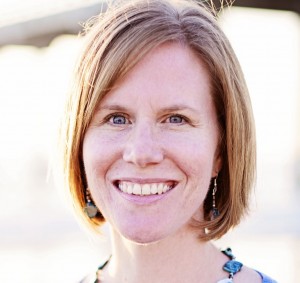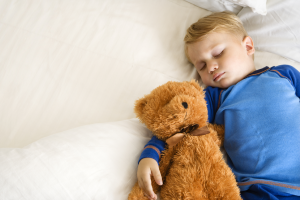
Meet Lori Strong. She is a Certified Child Sleep Consultant and a Certified Happiest Baby Educator. She is also the founder and owner of Strong Little Sleepers, which was built on the idea that all families need and deserve to get a good night’s sleep. Lori was the first certified child sleep consultant in Austin, Texas and was honored as Best Sleep Expert at the 2013 Austin Birth Awards. Additionally, she is a member of the International Association of Child Sleep Consultants. That’s a lot of sleep credentials! Lori combines her experience as an educator and a parent to offer customized sleep plans and support to families with children ages 0-6 across the country. We are overjoyed to feature Lori’s expertise today because most new parents we know can benefit from some trustworthy sleep advice.
BPP: How did you decide to become a sleep consultant and educator for new parents?
LS: My children were my inspiration! I have an 8 year old son and a 5 year old daughter. I was a teacher before I had kids, so I’ve always been passionate about education. I moved to Austin when I was 34 weeks pregnant and had no family or support system in place right before I had my son. We took classes, but nobody taught me anything about sleep other than to say that “babies sleep a lot”. That advice didn’t help much when my son struggled with sleep and was difficult to soothe. While holding a fussy baby in one arm and reading book after book in the other, I navigated through a ton of information about sleep and put together a plan to help him sleep better. It worked! Before I knew it, I was helping friends and family with their babies and they were all sleeping better too. I realized that so many parents were struggling with sleep and were overwhelmed about where to start in order to make things better. Supporting them made it possible for them to make changes. I decided to become a Certified Child Sleep Consultant because I wanted to take my informal training to a higher level so that I would be prepared to work with all kinds of sleep issues. I love teaching families about how child sleep develops and can be improved, and seeing their families transform when they start to get more sleep.
BPP: What is the age range of children that you consult on?
LS: I work with families who are expecting children through 6 years old. I offer newborn “What to Expect” sleep workshops and Happiest Baby on the Block newborn calming classes to expecting parents and new parents of babies under 4 months. For children over 4 months of age, we are able to begin sleep training if necessary.
BPP: What are the most common sleep issues that parents present to you?
LS: The biggest issues I see are struggles with naps– either they aren’t happening at all or they are very short.
The other main issue I am presented with involves children needing something to put them to sleep, such as rocking or other motion, food, etc… and then they don’t stay asleep. Older children may often come out of their rooms or have difficulty falling asleep and staying asleep without a parent present. There’s such a range of sleep issues depending on the age of the child!
BPP: How do you partner with parents to help them with sleep issues? What does a typical consultation look like?
LS: I offer three levels of support to parents: email, phone, and in-home visits. Each option begins with filling out an intake form. If the parents choose the email support, I communicate through the intake form so we can have a conversation and create a plan through email. The parents then implement recommended changes and use further email as needed to report back to me, ask questions, and celebrate your success. Phone consultations are typically an hour long (Skype is great because we can talk face to face from a distance.) We come up with a plan to help your child sleep better. After our talk, I follow up with a written plan that covers everything we talked about so you can refer to it while making your changes. Once you get started making changes, I support families for two weeks with follow up phone calls and emails. The in-home visit is very similar except that it is a 2-hour consultation in your home, which gives the extra support that comes with meeting someone in person. I also get to meet the children that way, which is one of my favorite parts of the consultation.
BPP: Do you subscribe to any particular infant-sleep philosophies or systems?
LS: I don’t follow one system or method because every child and family is different. I believe that some babies are born as really good sleepers, but some need to be taught how to self-soothe and become strong sleepers. Sleep is a biological need that we all have and the sleep needs of a child are different to those of an adult. I take various aspects of the family into consideration when creating a sleep plan for them which includes sleep environment, temperament of the baby, feedings, timing of sleep, and how the child falls asleep. My plans are very personalized; method is only one part of them.
BPP: What are your thoughts on co-sleeping with an infant?
LS: Controversial question! The American Academy of Pediatrics recommends co-sleeping (sharing a room) with your infant for the first six months of life to help reduce the risk of SIDS. Having a crib or bassinet in the same room as the parents or a co-sleeper attached to the bed are great ways to do this. This can also aid in breastfeeding success. Bed-sharing is not recommended because the SIDS risk is much higher when a baby is placed on a soft mattress with loose bedding and extra people in the bed. My goal is to make sure that when I work with a family, that they are practicing safe sleep. If a family chooses to bed-share, there are precautions that need to be made (just as we take precautions with a safe crib) to ensure the baby will be safe. There are many families that do this and it works well for them. If it is not working for everyone, then I think it’s best to make changes so that the entire family can sleep better. Whether you co-sleep or not, a baby still has certain biological sleep needs that need to be met. That doesn’t change with their sleep location.
BPP: Do you ever advise parents of twins or multiples?
LS: Yes! I’ve worked with many families of multiples. I admire these parents so much because they have super powers! Parents of multiples need to be organized. Keep charts in the bedroom so you can track feedings and sleep for each child. It’s helpful if each parent is responsible for one child at night (if possible). If this isn’t possible, try to employ the help of a relative or friend in those first few months. Scheduling becomes really important for twins because if they are on opposite schedules, your entire day can be spent feeding and trying to get babies to sleep, which is incredibly stressful and exhausting.
BPP: Do you have one suggestion that parents can use right now to help their children sleep better?
LS: An earlier bedtime is a magic bullet. It sounds crazy, but putting your child to sleep earlier will help them sleep longer. This is also true for babies! When children are overtired, they have a harder time falling asleep and staying asleep. If you make an earlier bedtime a priority when trying to improve sleep, your child will begin to get deeper sleep and will eventually sleep longer. This doesn’t mean they will sleep until 10 am, but it really helps in getting them quality sleep. Families always look at me a little funny when I suggest this, but it really does help!
BPP: Do you believe that infants and older children should get a certain number of hours of sleep? Is there a chart that you refer to?
LS: Studies show that children need various hours of sleep during the day and at night depending on their age. I refer to charts by Richard Ferber, the American Academy of Pediatrics, as well as the National Sleep Foundation, but they are suggestions and averages. I focus on the quality of sleep vs. the quantity of sleep when I work with families. If the environment is conducive for a child to sleep and they are given a consistent way to sleep, most children will respond by having healthy sleep habits, will get the necessary sleep they need and will appear to be well-rested and generally happy. I offer a free child sleep expectations guide on my website. You can download it at my website.
BPP: Lastly, do you have any sanity-saving suggestions for parents who are struggling with sleep-deprivation?
LS: Know that you are not alone and that it is possible to make positive changes. I really recommend working with a sleep consultant because chances are, if you’re sleep deprived, you’re too tired to read the books. If you’re looking online for information, you will come up with thousands of articles for and against each other. It can be so daunting and overwhelming and you might want to give up before you even get started. It’s important to understand that it can take some time to see changes, but if you’re consistent, things will really improve.
I also encourage new parents to ask for and accept help! And never trade clean dishes or a clean house for a nap.
For more information about working with Lori or to download a free child sleep expectations guide, visit her website at http://www.stronglittlesleepers.com
We also recommend that you follow Strong Little Sleepers on Facebook and Twitter for sleep tips, news, and giveaways. You can participate in Lori’s bi-weekly Nap Chat Happy Hours – ask a child sleep question and get an answer on the spot, for free!
Thanks again for answering all of our questions, Lori. We wish that we had known you when we were new, sleep-deprived parents!
C & K ♥





Leave a Reply